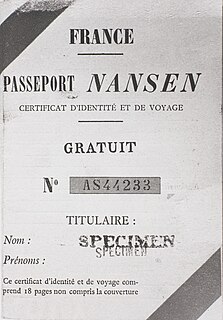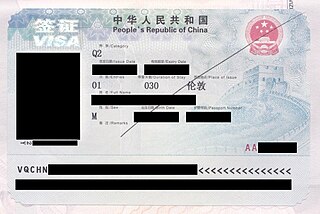
Nansen passports, originally and officially stateless persons passports, were internationally recognized refugee travel documents from 1922 to 1938, first issued by the League of Nations's Office of the High Commissioner for Refugees to stateless refugees. They quickly became known as "Nansen passports" for their promoter, the Norwegian statesman and polar explorer Fridtjof Nansen.

A visa is a conditional authorization granted by a polity to a foreigner that allows them to enter, remain within, or leave its territory. Visas typically include limits on the duration of the foreigner's stay, areas within the country they may enter, the dates they may enter, the number of permitted visits, or if the individual has the ability to work in the country in question. Visas are associated with the request for permission to enter a territory and thus are, in most countries, distinct from actual formal permission for an alien to enter and remain in the country. In each instance, a visa is subject to entry permission by an immigration official at the time of actual entry and can be revoked at any time. Visa evidence most commonly takes the form of a sticker endorsed in the applicant's passport or other travel document but may also exist electronically. Some countries no longer issue physical visa evidence, instead recording details only in immigration databases.
In international law, a stateless person is someone who is "not considered as a national by any state under the operation of its law". Some stateless people are also refugees. However, not all refugees are stateless, and many people who are stateless have never crossed an international border. On November 12, 2018, the United Nations High Commissioner for Refugees stated there are about 12 million stateless people in the world.

A certificate of identity, sometimes called an alien's passport, is a travel document issued by a country to non-citizens residing within their borders who are stateless persons or otherwise unable to obtain a passport from their state of nationality. Some states also issue certificates of identity to their own citizens as a form of emergency passport or otherwise in lieu of a passport. The visa requirements of certificates of identity may be different from those of regular passports.

The visa policy of the United States consists of the requirements for foreign nationals to travel to, enter, and remain in the United States. Visitors to the United States must obtain a visa from one of the U.S. diplomatic missions unless they come from one of the visa-exempt or Visa Waiver Program countries. The same rules apply for travel to all U.S. states, Washington, D.C., Puerto Rico and the U.S. Virgin Islands, as well as to Guam and the Northern Mariana Islands with additional waivers, while similar but separate rules apply to American Samoa.

A travel document is an identity document issued by a government or international entity pursuant to international agreements to enable individuals to clear border control measures. Travel documents usually assure other governments that the bearer may return to the issuing country, and are often issued in booklet form to allow other governments to place visas as well as entry and exit stamps into them. The most common travel document is a passport, which usually gives the bearer more privileges like visa-free access to certain countries. While passports issued by governments are the most common variety of travel document, many states and international organisations issue other varieties of travel documents that the holder to travel internationally to countries that recognise the documents. For example, stateless persons are not normally issued a national passport, but may be able to obtain a refugee travel document or the earlier "Nansen passport" which enables them to travel to countries which recognise the document, and sometimes to return to the issuing country.

A refugee travel document is a travel document issued to a refugee by the state in which they normally reside in allowing them to travel outside that state and to return there. Refugees are unlikely to be able to obtain passports from their state of nationality and therefore need travel documents so that they might engage in international travel.

The Swedish national identity card is a non-compulsory biometric identity document issued in Sweden. It is one of two official identity documents issued by the Swedish Police, the other being the Swedish passport. It is only issued to Swedish citizens, and indicates the citizenship.

Visitors to the Republic of China (Taiwan) must obtain a visa or authorization in advance, unless they come from one of the visa exempt countries or countries whose nationals are eligible for visa on arrival. All visitors must hold a passport valid for 6 months.

Visitors to the mainland of the People's Republic of China must obtain a visa from one of the Chinese diplomatic missions, unless they come from one of the visa exempt countries. The two Special Administrative Regions – Hong Kong and Macau – maintain their own independent border control policies and thus have their own separate visa requirements.

The visa policy of Canada requires that any foreign national wishing to enter Canada must obtain a temporary resident visa from one of the Canadian diplomatic missions unless they hold a passport issued by one of the 54 eligible visa exempt countries and territories or proof of permanent residence in the United States.

The New Zealand Certificate of Identity is an international biometric travel document issued by the Department of Internal Affairs to an alien resident of or visitor to New Zealand who is unable to obtain a national passport, or has a national passport unacceptable to Immigration New Zealand so that they can leave New Zealand. It is not usually issued to a person whose government is represented in either New Zealand or Australia.

The Canadian Certificate of Identity is an international travel document issued by Immigration, Refugees and Citizenship Canada to a permanent resident of Canada who is not yet a Canadian citizen, is stateless, or is otherwise unable to obtain a national passport or travel document. It is a biometric document with a grey cover and is bilingual in both English and French. The validity period of the travel document is determined by the issuing office.

The visa policy of the United Kingdom is the policy by which His Majesty's Government determines visa requirements for visitors to the United Kingdom, and the Crown dependencies of Guernsey, Jersey, and the Isle of Man and those seeking to work, study or reside there. All intended entrants must obtain a visa unless they are exempt.

Overseas Citizenship of India (OCI) is a form of permanent residency available to people of Indian origin and their spouses which allows them to live and work in India indefinitely. Despite its name, OCI status is not citizenship and does not grant the right to vote in Indian elections or hold public office. The Indian government can revoke OCI status in a wide variety of circumstances. As of 2020, there are 6 million holders of OCI cards among the Indian Overseas diaspora.

The visa policy of Singapore deals with the requirements to enter Singapore. A foreign national, depending on their country of origin, must meet certain requirements to obtain a visa, which is a permit to travel, to enter and remain in the country. A visa may also entitle the visa holder to other privileges, such as a right to work, study, etc. and may be subject to conditions.

The visa policy of Lebanon deals with the requirements which a foreign national wishing to enter the Republic of Lebanon must meet to be permitted to travel to, enter and remain in the country.

The Re-entry Permit is a travel document similar to a certificate of identity, issued by the United States Citizenship and Immigration Services to U.S. lawful permanent residents to allow them to travel abroad and return to the United States. It is a passport-like booklet with a blue-green cover with the words Travel Document displayed prominently on its cover. Individuals whose application for permanent residency has not yet been approved can instead apply for advance parole.
Immigration policies of the United Kingdom are the areas of modern British policy concerned with the immigration system of the United Kingdom—primarily, who has the right to visit or stay in the UK. British immigration policy is under the purview of UK Visas and Immigration.
The British Certificate of Travel is an international travel document and a type of Home Office travel document issued by the UK Home Office to non-citizen residents of United Kingdom who are unable to obtain a national passport or other conventional travel documents. Until 17 March 2008, the Certificate of Travel was called a Certificate of Identity. It is usually valid for five years, or if the holder only has temporary permission to stay in the United Kingdom, the validity will be identical to the length of stay permitted.















